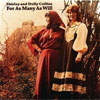 This is a very welcome reissue of the final album by the Collins sisters. They cast a marvelous spell on mysterious traditional songs from Southern England. It's all here: advice, a beheading, blacksmiths, erections, farming, happiness, a hanging, letters, loss, love, nosebleeds, poaching, pudding, rakes, revenge, treachery, and youth. All that and their cover of "Never Again," a Richard Thompson lament more contemporary to this 1978 recording.
This is a very welcome reissue of the final album by the Collins sisters. They cast a marvelous spell on mysterious traditional songs from Southern England. It's all here: advice, a beheading, blacksmiths, erections, farming, happiness, a hanging, letters, loss, love, nosebleeds, poaching, pudding, rakes, revenge, treachery, and youth. All that and their cover of "Never Again," a Richard Thompson lament more contemporary to this 1978 recording.
Shirley Collins met the US music historian Alan Lomax in London and, in 1959, journeyed with him across the United States collecting blues and roots songs for posterity. She returned to England and set about a similar project in her homeland. Long before all that, Shirley and her sister, Dolly, learned to appreciate music from their grandfather, Fred Ball, who knew many old tunes and played the tin whistle.  From their uncle, also called Fred Ball, Dolly learned how to include just the proper material in arrangements and not bring in unnecessary items. This is how songs were passed from one generation to the next and allowed for both preservation of material but also reinterpretation, mishearing, and other deviations from what might be called traditional.
A good example of this process is "Lord Allenwater," a song collected (or remembered) in 1904 by E.A. Stears of Sussex. Shirley sings, Dolly plays flute organ and piano, with Phil Pickett on cornet and Michael Gregory doing percussion. It is probably based on the facts and legends that have built up around the tale of James Ratcliffe, 3rd Earl of Derwentwater, who was beheaded on Tower Hill in 1716 for his part in the Jacobite uprising of the previous year. As Shirley comments:
"The entire story has been handed down as factual—as if it really happened. And other legends have sprung up around the event. It was said that on the night he was executed, the rivers on his estates ran blood, and that the Northern Lights shone more brightly that night than they ever had before; from then they were locally called "Lord Derwentwater's Lights".
Lord Allenwater" is a dramatic tale of how one man met his unavoidable doom with polite defiance, dignity, and generosity. It is one of several pieces which show how Shirley's voice allows stories to become utterly believable and she brings characters to life. Slipping free of gender and time, with her austere tone, she is Lord Allenwater, just as on another song she is the object of the blacksmith's affections, or Gilderoy's lovelorn devotee, and so on. Her singing is unaffected and seems as natural as a stick floating down a stream.
A similar tune (or is it meter?) is used for the happier sounding "Gilderoy," sung in the character of one who loves her golden boy constantly (but adjusts accordingly) from childhood to bereavement as the object of their affection leaves, marries another and is eventually hung after dalliance with a married woman. It's probably not a constant rule, but it often seems to me that the sweeter the folk tune the more bitter or horrific is the narrative outcome. Certainly, the more boisterous and clunky tunes on For As Many As Will tend to be about "lumps of pudding" or include references to virility couched in farming lingo wherein things "rise" if we stand close to our partner. Hey, whatever it takes to ensure the crop comes up for another year.
The original LP did not include the excellent song "The Blacksmith Courted Me" - but the piece is included on the CD. Shirley Collins recorded it three times (each with quite different lyrics). Shirley's calm voice combines with Dolly's restless piano lines for a perfect puzzle of discontent and regret. This song was collected by Ralph Vaughan Williams in 1909 from Mrs. Ellen Powell of Westhope, Hertfordshire. It is one of several included in The Penguin Book of English Folk Songs (1959) compiled by Vaughan Williams and A.L. Lloyd (who is also well respected for his, and Ewan MacColl's Blow Boys Blow, a fine collection of sea shanties also played on by Alf Edwards, and one which Captain Beefheart is said to have borrowed from Frank Zappa and never returned).
Such tunes as these have traveled far and wide and been transformed here and there. While Shirley went to the disenfranchised parts of the United States to learn the power of making history, the Collins sister didn't have to travel far to learn their love of music. As Dolly said, "we were lucky that way, listening to Grandad passed on to us feelings about the songs." On all their albums, Dolly's arrangements are perfect in giving variety to simple pieces of music and also in providing an uncluttered structure in which Shirley's voice can be heard. Her beautiful and melancholy singing has a plain humility and yet is full of authority.
Dolly has passed away and Shirley gave up public performance years ago. Their approach to recording has a political aspect in that they insist upon the importance of ordinary lives. In that sense, Shirley and Dolly Collins preserve not only the songs but also the working lives of the rural people who have sung them. They played a vital part in the resurgence of interest in traditional musical forms. Anyone (with or without a musical grandfather) could do worse than to start here if planning to learn how to listen to and create music.
Read More


